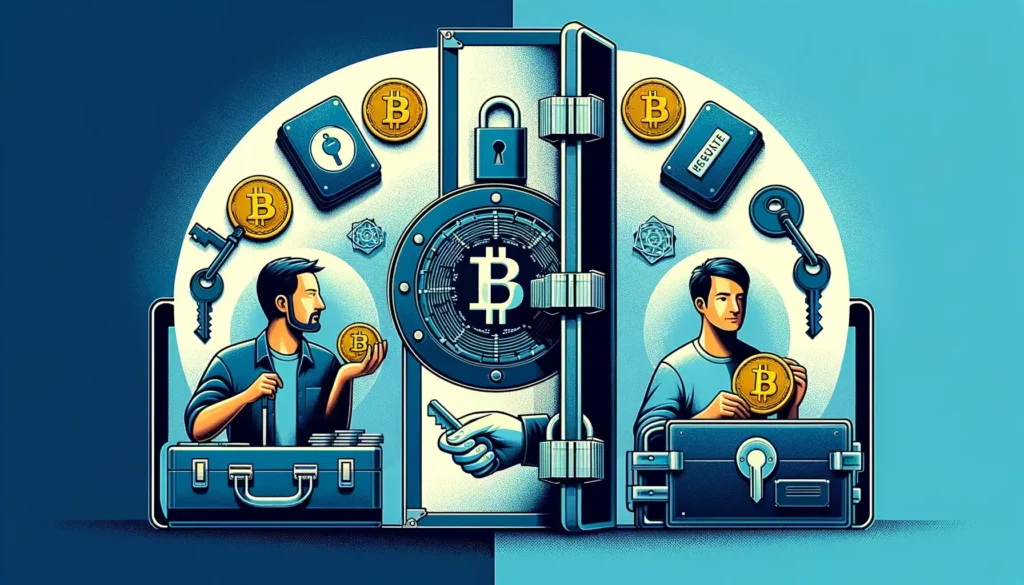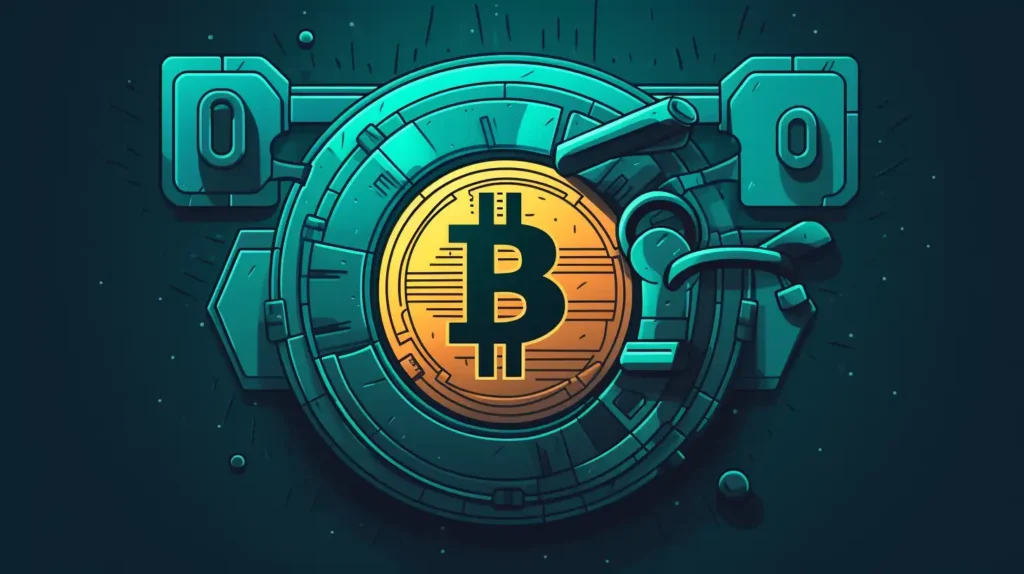Imagine standing at the threshold of a new financial universe, where Bitcoin is the key to unlocking endless possibilities. This is the world of cryptocurrency, with Bitcoin leading the charge as the pioneering digital currency.
At the heart of navigating this digital landscape are Bitcoin wallets, crucial tools for anyone venturing into the world of cryptocurrencies. They are more than mere digital pouches; they are sophisticated mechanisms that secure and manage your digital assets, ensuring your journey into cryptocurrency is both safe and rewarding.
Key Takeaways
- Bitcoin’s Prominence: Understand Bitcoin’s role as the leading digital currency.
- Wallets’ Critical Role: Recognize how Bitcoin wallets are essential for secure storage and management of digital assets.
- Empowering Users: Learn how these wallets empower users with the management and security of their cryptocurrencies.
In this comprehensive guide, we’ll explore the intricacies of Bitcoin wallets. You’ll discover how they function, the different types available, and how to use them effectively.
Whether you’re a beginner or looking to deepen your understanding, this guide will equip you with the knowledge needed to confidently navigate the world of Bitcoin. Let’s dive in and unlock the full potential of your digital fortune.
Understanding Bitcoin Wallets: A Foundation for Secure Storage
The Essence of Bitcoin Wallets
In the dynamic world of cryptocurrency, a Bitcoin wallet serves as your digital vault. It’s where your digital currency lives and breathes. But what exactly is a Bitcoin wallet?
- Digital Storage: A Bitcoin wallet is a digital platform where you can securely store, send, and receive Bitcoin and other cryptocurrencies.
- Key Management: It manages your private and public keys, the essential tools for Bitcoin transactions.
Private Keys vs. Public Keys
Understanding these keys is like learning the ABCs of Bitcoin:
- Public Key: Consider this your wallet’s address. It’s what you share with others to receive Bitcoin.
- Private Key: This is your secret access code. It’s akin to a highly secure password that should never be shared.
Custodial vs. Non-Custodial Wallets
Bitcoin wallets come in two main flavors:
- Custodial Wallets: Here, a third party holds your private keys. It’s like entrusting a bank to safeguard your assets.
- Non-Custodial Wallets: You hold the keys, giving you full control over your digital assets.

Exploring Custodial Wallets: Convenience and Security in the Hands of Others
The Nature of Custodial Wallets
Custodial wallets represent a blend of convenience and trust. Here’s what you need to know:
- Managed by Third Parties: Your keys are in the hands of a trusted entity, much like how banks manage your money.
- Ease of Use: They often come with user-friendly interfaces, making them a go-to choice for beginners.
The Pros and Cons
While custodial wallets are convenient, understanding their nuances is key:
- Advantages:
- User-Friendly: Ideal for those new to Bitcoin, offering straightforward interfaces and quick access to funds.
- Recovery Options: Lost your access details? Custodial services can help you regain access.
- Potential Risks:
- Security Concerns: The responsibility of safeguarding your keys lies with the custodian. Choose a reputable service to minimize risks.
Choosing a Custodial Wallet
When opting for a custodial wallet, consider:
- Reputation: Look for providers with a strong track record.
- Security Measures: Ensure they employ robust security protocols.
Embracing Non-Custodial Wallets: Unparalleled Control over Your Digital Assets
The World of Non-Custodial Wallets
Non-custodial wallets put you in total control of your digital assets. Here’s what sets them apart:
- Direct Control: You manage your private keys, meaning full responsibility for their safety.
- Enhanced Security: Without third-party control, these wallets offer heightened security for your assets.
Different Types of Non-Custodial Wallets
Diverse in form, each type of non-custodial wallet caters to different needs:
- Software Wallets: Digital apps for your phone or computer. They’re convenient but require careful security management.
- Hardware Wallets: Physical devices like USB drives, they store your keys offline, away from online threats.
- Paper Wallets: Physical documents with your keys printed on them. Simple but require safekeeping from physical damage.
Advantages of Non-Custodial Wallets
Emphasizing control and security:
- Total Ownership: Complete control means no dependency on third parties for access to your assets.
- Security Assurance: Managing your keys reduces the risk of external breaches.
Navigating the Landscape of Bitcoin Wallets: Selecting the Right Fit for Your Needs
Choosing the perfect Bitcoin wallet is like picking the right tool for a crucial job. It requires understanding your needs and matching them with the right features.
Factors to Consider
When selecting a Bitcoin wallet, weigh these factors:
- Security: How robust are the wallet’s security features?
- Ease of Use: Is the wallet user-friendly, especially for beginners?
- Features: Does it support multiple currencies, or offer backup and restoration features?
- Currency Support: Can it store various types of cryptocurrencies?
Making an Informed Decision
Here’s how to approach your choice:
- Assess Your Needs: Are you a frequent trader, or a long-term investor? Choose a wallet that aligns with your activities.
- Do Your Research: Read reviews and user experiences to gauge reliability and performance.
- Understand the Risks: Each wallet type has its own set of risks. Familiarize yourself with them to make an informed choice.
Remember, the right wallet is out there for everyone, whether you’re dipping your toes into Bitcoin or diving in headfirst.
Enhancing Bitcoin Wallet Security: Safeguarding Your Digital Assets
In the digital world, the security of your Bitcoin wallet is as important as the lock on your front door in the physical world. Let’s bolster your defense against potential digital threats.
Essential Security Practices
Protect your Bitcoin wallet by adhering to these practices:
- Strong Passwords: Use complex, unique passwords.
- Two-Factor Authentication (2FA): Add an extra layer of security to your wallet.
- Private Key Management: Never share your private keys and store them securely.
Advanced Security Measures
For those seeking additional security layers:
- Reputable Exchanges: Use trusted platforms for any transactions.
- Phishing Scam Awareness: Be alert to fraudulent attempts to gain access to your wallet.
- Backup: Regularly back up your wallet to recover your assets in case of device failure or loss.

Embarking on a Secure Crypto Journey: Your Path to Digital Mastery
As we conclude our comprehensive guide to Bitcoin wallets, remember that the journey into the realm of cryptocurrency is both exciting and complex.
Armed with knowledge about different types of wallets and security measures, you’re now equipped to navigate this digital frontier with confidence.
Empower Your Crypto Experience:
- Carefully choose a Bitcoin wallet that aligns with your needs.
- Prioritize security to protect your digital assets.
- Stay informed and adapt as the cryptocurrency landscape evolves.
Embark on your crypto journey with a focus on security, wisdom, and a keen eye on the future. The world of digital finance awaits, and you’re now ready to explore it with assurance and savvy. Welcome to the vibrant community of cryptocurrency enthusiasts! 🚀🌐
FAQ
| Frequently Asked Questions (FAQs) | Answers |
|---|---|
| What is a Bitcoin wallet? | A Bitcoin wallet is a digital tool that allows you to store, send, and receive Bitcoin and other cryptocurrencies. It manages your private and public keys, essential for cryptocurrency transactions. |
| What are the differences between custodial and non-custodial wallets? | Custodial wallets are managed by a third party that holds your private keys, offering convenience and ease of use. Non-custodial wallets give you full control over your private keys, providing enhanced security and control. |
| How do I choose the right Bitcoin wallet? | Consider factors like security, ease of use, features, supported currencies, and whether you prefer a custodial or non-custodial wallet. Research and understand the risks associated with each type before making a decision. |
| What are the best practices for Bitcoin wallet security? | Use strong, unique passwords, enable two-factor authentication, never share your private keys, regularly back up your wallet, and stay alert to phishing scams. Also, consider using reputable exchanges for transactions. |
| Can I store multiple cryptocurrencies in a Bitcoin wallet? | Many Bitcoin wallets now support multiple cryptocurrencies. However, it’s essential to check if the wallet you choose supports the specific cryptocurrencies you intend to store. |




